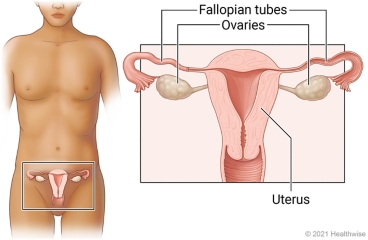
What is a salpingectomy?
Salpingectomy is surgery to remove the fallopian tubes. When one or part of a tube is removed, it is called a partial salpingectomy.
The tubes are in the lower belly. They lead up from each upper side of the uterus. They end near the ovaries. When an egg is released by an ovary, it travels down a fallopian tube toward the uterus.
The tubes may be removed at the same time as surgery to remove the uterus or ovaries.
Why is it done?
You may have surgery to remove your fallopian tubes for several reasons.
- Sterilization. The surgery blocks sperm from reaching an egg. This means you cannot get pregnant.
- Ectopic pregnancy. The surgery may be used to remove a fertilized egg that grows in a fallopian tube. Or it may be used if the tube may rupture or is very damaged.
- Cancer. If you are at risk of cancer in the ovaries, fallopian tubes, or tissues that line the inside of the belly, the surgery is used to lower that risk. It's also used to take out tubes that already have cancer.
- A blocked or damaged fallopian tube.
- Fertility problems. When a fallopian tube is blocked and fills with fluid, the fluid may leak into the uterus. This can stop an egg from implanting. The surgery may be used to remove the source of the fluid. It may be done before in vitro fertilization (IVF).
How is it done?
This surgery can be done several ways. Sometimes just the fallopian tubes are removed. But sometimes the uterus, ovaries, or both are also removed. This can change the way your surgery is done.
- Laparoscopic surgery. It's done with very small cuts in your belly. The doctor puts a lighted tube, or scope, and other tools through the cuts.
- Open surgery. The doctor makes a larger cut in the belly.
- Vaginal surgery. A cut is made in the vagina.
Before your surgery starts, you will get medicines to prevent pain and make you sleep.
What can you expect after surgery?
The length of your hospital stay depends on what kind of surgery you had. You will likely go home the day of your surgery. But if your uterus was removed (hysterectomy), your hospital stay may be longer.
Your return to normal activities can take from a few days to a couple of weeks. How long it takes depends on the type of surgery. It also depends on your overall health and the kind of work and other activities you do. For some people, it might take 4 to 6 weeks to fully recover.
Current as of: May 5, 2025
Author: Ignite Healthwise, LLC Staff
Clinical Review Board
All Ignite Healthwise, LLC education is reviewed by a team that includes physicians, nurses, advanced practitioners, registered dieticians, and other healthcare professionals.

